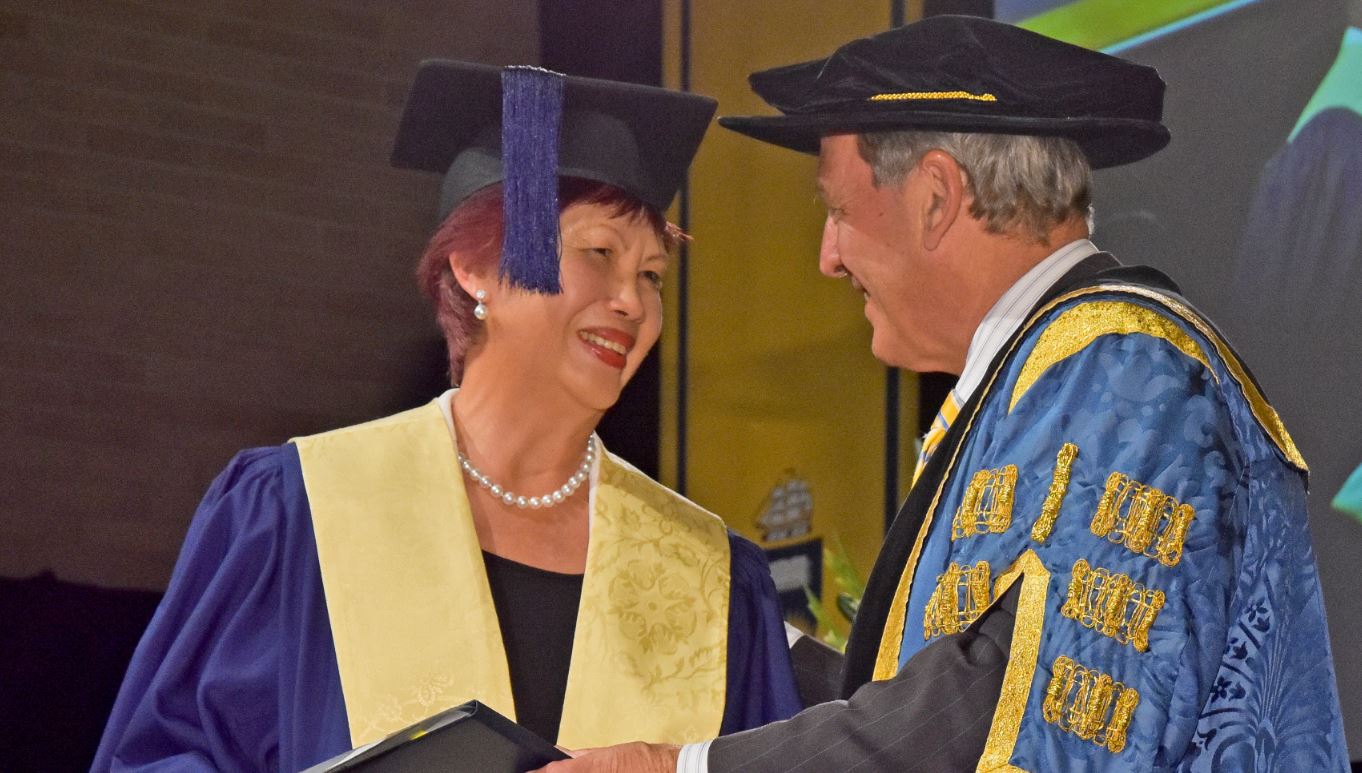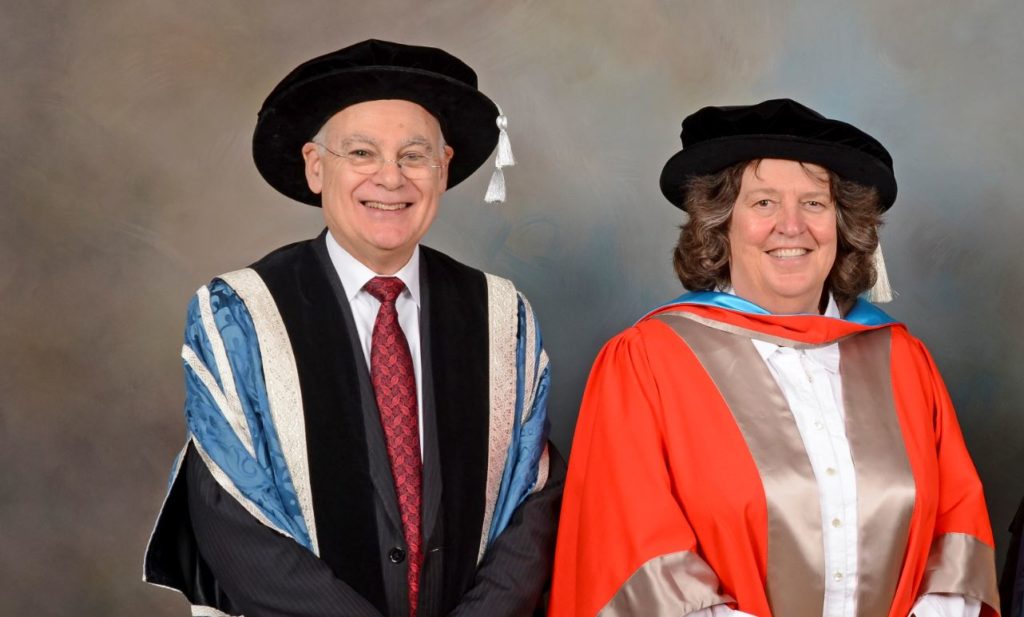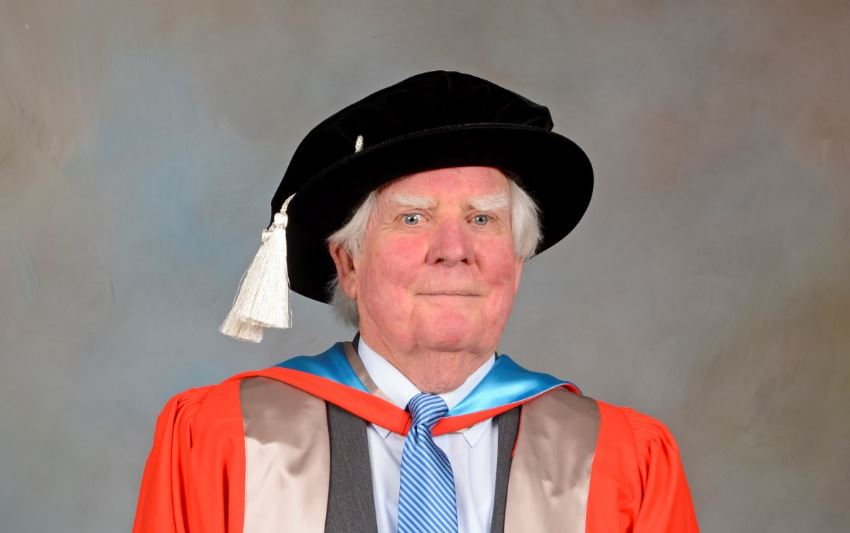
Leading women and men in the fields of mining, medicine and business were recognised with special citations at Flinders University’s recent graduation ceremonies.

BHP’s Principal Geometallurgist Dr Kathy Ehrig received a degree of Doctor of Science honoris causa in recognistion of her 24-year quest to unravel the complex mineralogy and geology of South Australia’s vast Olympic Dam mineral deposit – the largest uranium, fifth largest copper and third largest gold resource on the planet.
Dr Ehrig’s esteemed international reputation as a researcher and her rise to a senior position in the world’s biggest mining company stands as a landmark achievement in a male-dominated industry.
Dr Ehrig has discovered more about the geology, mineralogy and genesis of the Olympic Dam deposit than any other person. Her ability to understand the genesis of Olympic Dam has enabled the development of metallurgical performance predictors for the entire deposit, including predictors of mineral abundances based on drill core assays.
However Dr Ehrig said she felt privileged to receive the Doctor of Science honoris causa from Flinders University.
Originally from California, she acknowledged the pioneering work of other metallurgists, geologists, mining engineers and mining professionals who worked at Olympic Dam before her.
“I am indeed privileged to have worked throughout my career with highly talented and skilled academics and mining industry professionals,” she said, advising Science and Engineering students to keep learning from others, and to “be generous with acknowledging the contributions of those before you and your colleagues”.
“Everyone in your work group has a role to play. There is no positive linear relationship between someone’s intelligence and their formal education level.
“You can learn from all those around you.
“Intellectual intelligence alone will not make you successful. You need a strong sense of purpose and a high level of perseverance to get through times when everything is not going the way you expect.”
Dr Ehrig also urged this year’s graduands to “position yourself and be prepared to recognise and seize an opportunity when it presents itself”.
“Windows of opportunity are not always open. I have never regretted my decision to move to Australia and work on what I consider the most interesting mineral deposit in the world.”

Emeritus Professor Peter Mudge was awarded the degree of Doctor of Science honoris causa to recognise his significant roles in research, medical education and voluntary medical leadership.
His extraordinary career and service to medicine spanning more than 50 years has previously been recognised with being awarded a Member of the Order of Australia in 2016, along with the prestigious Rose Hunt Award and Life Fellowship from the Royal Australian College of General Practitioners.
Professor Mudge said he was very pleased with the “unexpected honour”.
“It is particularly pleasing because it was at Flinders University in the 1970s that my academic career began,” he said.
Memorable mentors in his early years of rural general medical practice in South Australia included the Public Health Physician Professor Anthony Radford, the late Professor Deane Southgate, from the then Department of Primary Care at Flinders, and also Professor John Chalmers, the Foundation Professor of Medicine at Flinders University.
“When I began rural general medical practice in Berri, after graduating and working in hospitals in Adelaide and Darwin for three years, I found that learning experience acquired there did not cover all of my patients’ needs,” Professor Mudge said.
“(Professor Southgate) was passionate about developing a curriculum for the teaching of General Practice and new ways to teach it.
“I was invited to assist in this development, and this was my first part-time academic appointment.
“A new curriculum was developed and taught and became the basis of further development on my appointment to the University of Tasmania.
“Professor Chalmers, who was involved on NHMRC research funding committees, was generous with his time and advice, and in helping us with the College of General Practitioners to develop a body of knowledge of general practice teaching and learning and treatment care.”
Professor Mudge said the Royal Australian College of GPs, founded in 1958, now has 35,000 members, “many of whom share the roles of mentors in education and research”.
“Similar bodies exist in most professional spheres and are rich sources of possible mentors.”
Mrs Peggy Lau Flux, a success story close to Flinders University’s heart, is being named a Companion of the University in recognition of her invaluable contribution to the University’s governance and financial performance.
From a successful career as an international corporate banker in Hong Kong, Mrs Lau Flux came to Adelaide 25 years ago, and has been crucial in helping to build Flinders University’s capacity and growth, especially in the health, education and community sectors.
Her extensive knowledge and expertise made her a key member of the Flinders Council leadership team from 2005 to 2016, and she remains active as a Director and Chair of Flinders Partners, the commercialisation arm for the University.
“Since becoming an Australian citizen in 1994, giving back to society has been a focus and a priority for me, and so I feel enormously honoured and humbled to receive such a gift from Flinders University,” Mrs Lau Flux says.
“I likened my feeling towards the award ceremony to my experience of being a torch bearer for the Sydney 2000 Olympic Games, one of the most joyous moments of my life.
“When I was preparing for my six marathons, I used to get up very early in the morning to train, something I really enjoyed doing.
“It was beyond my wildest dreams, then, that simply doing something I enjoyed and felt passionate about would one day land me such a prestigious recognition in Australia.”
A member of the Board of Taxation, Mrs Lau Flux has served as a council member of Flinders University for 12 years and was chair of the Finance and Investment Committee.
Since her arrival in Australia in 1992, she has served on boards at both state and federal levels, including the Royal Adelaide Hospital, the Council of International Trade and Commerce SA, National Multicultural Advisory Council, the Australia China Council, Asia-Pacific Business Council for Women and Joanna Briggs Institute.
While working in international banking, including with Citibank and Standard Chartered Bank in Hong Kong, she was involved in a project for installing the first electronic banking system in China and the determination of risk asset weighting.
Mrs Lau Flux is bilingual in English and Chinese, has lived in Canada, and has extensive local, national and international networks.

